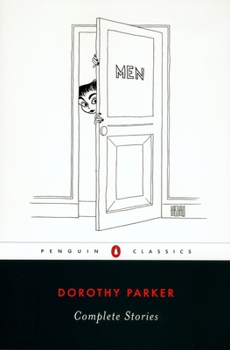Complete Stories
(Part of the Dorothy Parker - Toplu Öyküler Series and Dorothy Parker Series)
Select Format
Select Condition 
Book Overview
As this complete collection of her short stories demonstrates, Dorothy Parker's talents extended far beyond brash one-liners and clever rhymes. Her stories not only bring to life the urban milieu that... This description may be from another edition of this product.
Format:Paperback
Language:English
ISBN:0142437212
ISBN13:9780142437216
Release Date:December 2002
Publisher:Penguin Group
Length:480 Pages
Weight:0.70 lbs.
Dimensions:0.8" x 5.1" x 7.8"
Age Range:18 years and up
Grade Range:Postsecondary and higher
Related Subjects
Anthologies Classics Contemporary Fiction Literary Literature & Fiction Short StoriesCustomer Reviews
5 ratings
Darker than expected, but witty
Published by Thriftbooks.com User , 19 years ago
Perhaps because it doesn't include some of Dorothy Parker's well-known, light-hearted poetry or journalism, this collection of short stories was darker than I expected. Some of what are considered Parker's classic short stories - such as "Big Blonde" and "A Telephone Call" - impressed me less than several other stories. "Mr. Durant," for example, is a story about abortion published in 1924 that gets around the censors of that day by not using the A word at all. Incredibly well done. In this book, at least, Parker's wit excels in the closing section of "sketches" rather than stories. "Our Tuesday Club" is an assemblage of character descriptions, rather than a narrative, and I regard it as a wonderful example of Parker's wit. Despite their age, most of the stories in this collection hold up well.
Men never make passes at girls reading Dorothy Parker
Published by Thriftbooks.com User , 21 years ago
Dorothy Parker is one of the great women writers of the twentieth century. Though her life was marred by alcoholism and rather poor choices, her biting, insightful stories are a window into the twenties and women in general. I read her stories whenever I've had a rough day and need a giggle.
A Lime-Green Look at the Battles of the Sexes
Published by Thriftbooks.com User , 22 years ago
And I thought I knew all of the short story writers who write good social satire, especially about the Battle of the Sexes. Do you like John Updike's dissonant couples the Maples? John Cheever's middle-class suburban sashayings? John O'Hara's accounts of evil-propelled mis-treatments and non-treatments? Ring Lardner's tales of hamfisted bunglings? Katherine Mansfield's dry-point etchings of looming males and tendril-like females?To these I can now add Dorothy Parker--whom I discovered only last month after enjoying the above social-critics for decades. A sharp-tongued journalist, Parker wrote in New York City in the 1920's through the 1950's. She's a key addition to the "fruit salad" of these writers--call her a lime, perhaps--small, tart, acid but somehow quenching our thirst for the truth however tangy?Parker precisely pinpoints interpersonal shipwrecks. Marriage is--what happens. Often it's like this:In "New York to Detroit," on the telephone, a man mechanically shoves a desperate woman out of his life. The bad connection aids his "misunderstandings" of her frantic pleas.In "Here We Are," a just-married couple travel by train to their New York City honeymoon hotel. But we see already the stress-fractures of immature overreactions, and how out of them starts to ooze the lava of hatred which will surely melt down (or burn out) the marriage soon.In "Too Bad," women are perplexed, even astonished, that the Weldons separated. Such an ideal couple! Except Parker eavesdrops us into the couple's typical evening at home. Its genteel vacancy, polite non-communication, and quiet distancing tell the tale.Is Parker too crude a caricaturist? Heavy on the satire, too bitter personally? True, her women seem simplified: helplessly-hysterical, nice-nice faceless patseys or creampuffs, captives of bland routines--and of men. Her men similarly seem generic males-of-the-species, "blunt bluff hearty and...meaningless," conventionally-whiskered and all, chauvinistically-insensitive if not cruel. Okay... But if it's overdone, why do I feel I have known and seen these people, or traces of them, often, and not in New York of the 1920's-1950's either?
The "Daria" of the 1920's
Published by Thriftbooks.com User , 24 years ago
Dorothy Parker had a style of writing all her own, and this book is a perfect introduction to her work. (I also suggest you buy the companion book of her poetry). To me, the best part of the book by far is the second half, which contains essays where she describes people in different settings, and comments on their habits and mannerisms sarcastically and subtly - if you are a big fan of dry humor (such as W. C. Fields and Robert Benchley), as I am, then you will find this book to be worth its weight in gold for these essays alone. The stories, however, are of a different tone; some are witty, some are poignant, some are downright depressing. This collection does, however, show Parker at her best - it shows her range and her depth, her ability to comment on issues which were considered unmentionable at the time (such as suicide, alcoholism, child abuse, abortion, infidelity), and her distaste for the artificial and the egotistical. My favorite essays are probably "A Dinner Party Anthology" and "Our Tuesday Club"; favorite story of all time is "Lolita" (NOT the basis for the movie, in case you don't know; anyone with a romantic bone in his/her body will love it). Wonderful work by an American original who should have been included in all those lists that were circulating at the close of 1999 of "100 most influential / important women of the century" (instead of the likes of Marilyn Monroe or Madonna).
Dorothy Parker is a true hero for American fiction
Published by Thriftbooks.com User , 25 years ago
Ms. Parker's collection of short stories are modern and funny. Many of the dialogues detailed in her works can still be heard uttered today between men and women.





